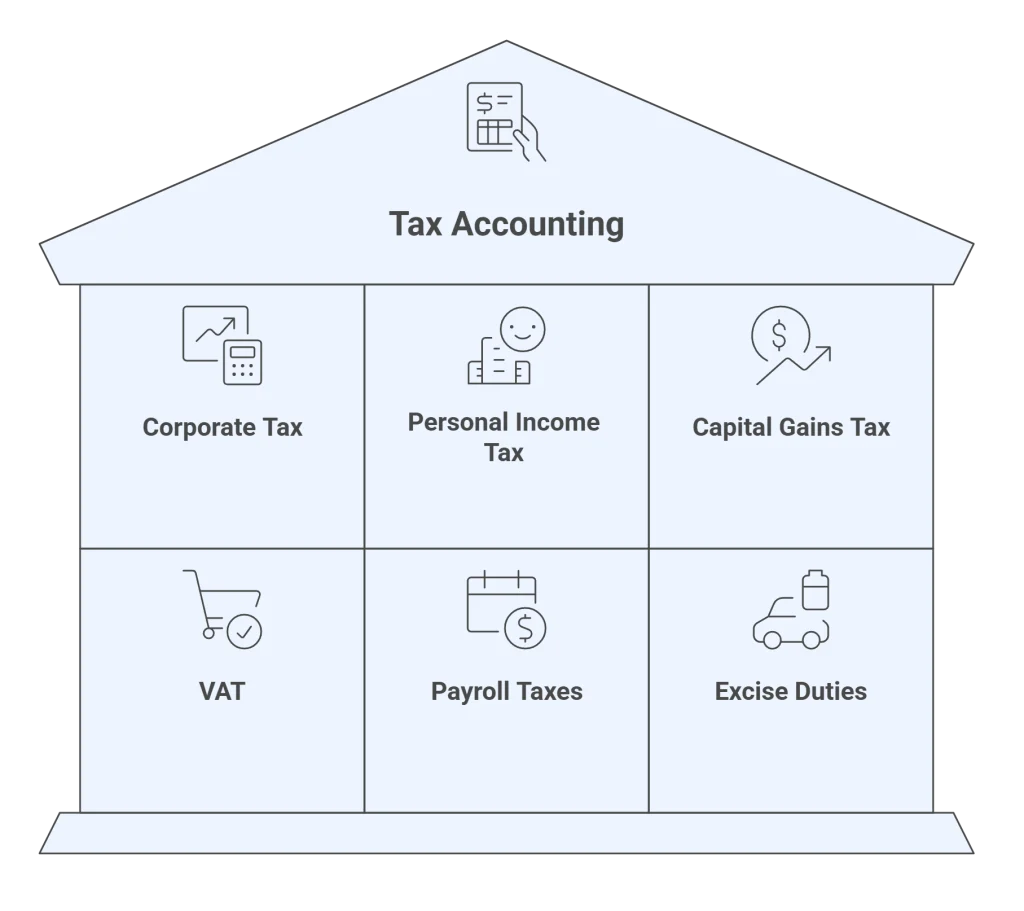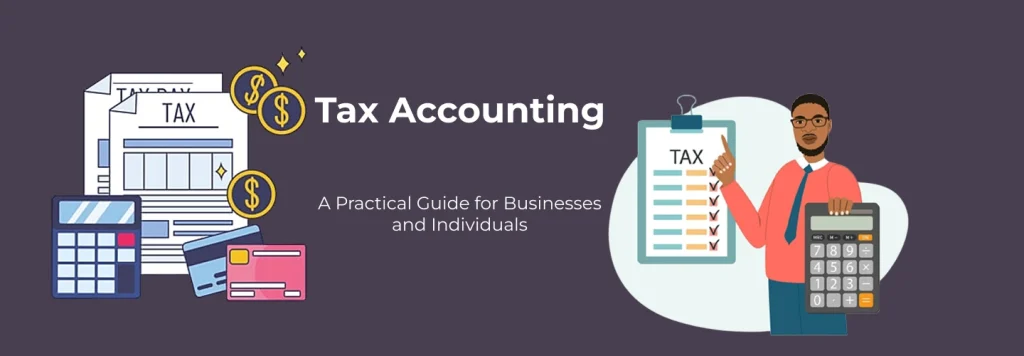Taxes are an unavoidable part of life—and business. Navigating tax regulations can be overwhelming, especially as rules vary depending on location, income, and business type. This is where tax accounting comes in. It ensures compliance with tax laws, optimises tax liabilities, and supports accurate financial reporting.
Whether you’re self-employed, managing a business, or pursuing a career in finance, understanding tax accounting is essential for financial efficiency and peace of mind.
Table of Contents
What is Tax Accounting
Tax accounting is a specialised area of accounting focused on preparing tax returns and ensuring compliance with relevant tax laws and regulations. Unlike financial accounting, which aims to show the overall financial health of an organisation, tax accounting specifically looks at taxable income and legal obligations.
Tax accounting applies to individuals, businesses, corporations, and other entities. It deals with income, deductions, credits, and the timing of when items are recognised for tax purposes.
Objectives of Tax Accounting
Tax Compliance: Ensuring all returns and reports meet government regulations and deadlines.
Accurate Reporting: Calculating taxable income accurately to avoid penalties.
Tax Planning: Structuring financial decisions to legally minimise tax liability.
Audit Preparation: Maintaining organised records in case of tax authority reviews.
Avoiding Legal Risk: Helping businesses and individuals follow tax laws to prevent fines or legal issues.
How Tax Accounting Differs from Financial Accounting

| Feature | Tax Accounting | Financial Accounting |
| Purpose | Compliance with tax laws | Provide financial information to stakeholders |
| Basis | Tax laws and rules | GAAP or IFRS |
| Users | Tax authorities, internal use | Investors, creditors, public |
| Reporting | Annual or per tax period | Periodic (quarterly or annually) |
Tax accounting often results in figures that differ from those in financial statements due to different recognition rules.
Key Components of Tax Accounting
Taxable Income Calculation
Determining income that is subject to tax after considering deductions, allowances, and exemptions.
Deduction and Credit Analysis
Identifying expenses that can reduce taxable income (e.g., business expenses, interest payments) and applicable tax credits.
Filing Returns
Preparing and submitting personal or corporate tax returns within deadlines.
Deferred Taxes
Accounting for income taxes payable or refundable in future periods due to temporary differences.
Tax Planning
Strategising to take advantage of available tax benefits, such as:
Timing income or expenses
Choosing a tax-efficient business structure
Investing in tax-advantaged accounts or assets
Types of Taxes Covered by Tax Accounting
Tax accounting isn’t just about income tax. It spans a variety of tax types, including:
-
- Corporate Tax – Paid by companies on profits
-
- Personal Income Tax – Paid by individuals on earnings
-
- Capital Gains Tax – Applied to profits from selling assets
-
- VAT (Value Added Tax) – Paid on goods and services
-
- Payroll Taxes – Includes income tax withheld and national insurance contributions
-
- Excise Duties – On specific goods like alcohol or fuel

Who Needs Tax Accounting?
Individuals
Especially those with complex financial situations (self-employed, landlords, investors) who need to optimise tax obligations and file accurately.
Small and Medium Enterprises (SMEs)
To meet obligations, claim allowable expenses, and plan for tax-efficient growth.
Corporations
To handle complex tax rules, deferred taxes, international taxation, and compliance audits.
Nonprofits
To ensure they maintain charitable status and meet reporting obligations.
Common Tax Accounting Methods
Cash Basis
Income and expenses are recorded when cash is received or paid. Common among small businesses.
Accrual Basis
Income and expenses are recognised when earned or incurred, not when cash is exchanged. Often required for larger businesses.
The Role of a Tax Accountant
A tax accountant provides services that go beyond basic return filing. Their responsibilities include:
Preparing personal or corporate tax returns
Advising on tax planning strategies
Ensuring up-to-date compliance with tax laws
Representing clients during tax audits
Liaising with HMRC or other tax authorities
Essential skills include strong analytical thinking, attention to detail, knowledge of current tax legislation, and familiarity with accounting software like Sage, Xero, or TaxCalc.
Tax Software and Tools
Modern tax accounting is supported by robust software to automate tasks and reduce errors:
QuickBooks – Offers integrated tax tracking for businesses
Xero – Cloud-based accounting with tax reporting tools
TaxCalc / GoSimpleTax – UK-focused solutions for individuals and accountants
FreeAgent – Ideal for freelancers and small businesses
These tools streamline calculations, flag compliance issues, and simplify digital tax submissions under Making Tax Digital (MTD) requirements in the UK.
Benefits of Effective Tax Accounting
Avoids penalties and interest from late or incorrect filing
Reduces tax liabilities legally through deductions and reliefs
Improves cash flow through accurate forecasting
Supports business decision-making with clear cost expectations
Prepares you for audits or tax authority queries confidently
Tax Accounting in the UK: Key Considerations
Self-Assessment: Required for self-employed, landlords, and higher earners.
Corporation Tax: Applies to all limited companies; returns must be filed annually.
VAT Registration: Required for businesses with turnover above the threshold (£90,000 in 2025).
Making Tax Digital: Businesses must keep digital records and file returns using approved software.
Staying informed about HMRC regulations is critical for UK taxpayers.
Conclusion
Tax accounting is essential for financial compliance and efficiency, whether you’re an individual managing multiple income streams or a business navigating complex obligations. By understanding the principles and practices of tax accounting, you can minimise liabilities, stay compliant, and plan effectively for the future.
A solid grasp of tax accounting—alongside the support of skilled professionals or reliable software—ensures you’re always one step ahead of the tax man.
Other Related Readings
What Is Accounting? A Beginner’s Guide to Financial Basics
What is Bookkeeping? A Complete Beginner’s Guide
What is Financial Accounting? A Clear Guide for Beginners
What is Managerial Accounting? A Practical Guide for Business Decision-Making
What is Cost Accounting? Understanding Costs to Boost Profitability
What is Tax Accounting? A Guide to Managing Taxes Effectively
What is Public Accounting? Services, Roles, and Career Insights
What is Private (Corporate) Accounting? A Guide for Businesses and Aspiring Accountants






